Super User
Valmet to supply solids measurements and sludge dewatering optimizer to Águas de Portugal wastewater treatment plant in Lisbon, Portugal
Valmet will deliver solids measurements and Valmet Sludge Dewatering Optimizer to Águas do Tejo Atlântico in Alcantara, Lisbon, Portugal. The optimization, together with reliable solids measurements use, aims at improving the plant's energy and environmental efficiency. The order was placed by Valmet’s local partner Tecnilab Portugal SA, the official distributor for Valmet's wastewater solutions and services in Portugal.
The order was included in Valmet's orders received for the first quarter of 2022. The value of the order will not be disclosed. The delivery takes place during the first half of 2022.
“Our mission is to operate and manage the multi-municipal wastewater sanitation system of Greater Lisbon and Western Portugal, ensuring the quality, continuity, and efficiency of the public wastewater services. This solution will support our efficiency targets with sludge dewatering by increasing the dry content and decreasing the use of polymers,” says Paulo Inocêncio, Responsible for Strategic Studies of the Asset Management Department.
"Reliable solids measurements enable accurate monitoring of the sludge dewatering process and provide valuable process data. Costs can be saved, and process efficiency increased when the measurements are linked with an advanced online sludge dewatering optimizer," explains Amadeu Santos, Country manager Portugal, Automation Systems business line, Valmet.
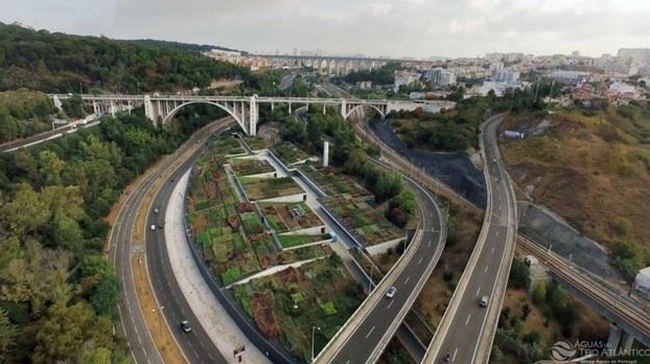 Águas do Tejo Atlântico Alcantara wastewater treatment plant
Águas do Tejo Atlântico Alcantara wastewater treatment plant
Technical information about the delivery
The delivery consists of Valmet Total Solids Measurement, Valmet Low Solids Measurement, Valmet Dry Solids measurement and Valmet Sludge Dewatering Optimizer as well as samplers and services.
Valmet Sludge Dewatering Optimizer has been developed especially for optimizing sludge dewatering centrifuges at municipal and industrial wastewater plants. In addition to savings in chemicals, energy and transportation costs, the entire plant capacity can be increased as the number of solids circulating at the plant is smaller.
Automating the dewatering process reduces the need for laboratory sampling and handling. Moreover, it produces online process data and decreases the need for continuous monitoring by plant operators. Optimization, together with reliable solids measurements, improves the plant's energy and environmental efficiency.
About the customer
Águas do Tejo Atlântico, S.A. is a public limited company of exclusively public capital, part of the Águas de Portugal group, responsible for the management and operation of the multi-municipal wastewater sanitation system of Greater Lisbon and West, on an exclusive basis and for a period of 30 years. The company aims to collect, treat, and reject domestic and urban effluents in a regular, continuous, and efficient way from about 2.3 million inhabitants, covering the municipalities around Lisbon metropolitan area.
Águas de Portugal is a Portuguese group of companies providing services, directly or indirectly, throughout all of mainland Portugal and across the fields of water supply and wastewater sanitation. In Portugal, the AdP group holds stakes in a set of companies which, in partnership with municipalities, provide services to around 80% of the Portuguese population. The group runs further operations in the renewable energies and shared service sectors as well as its ongoing engagement in international markets.
Valmet is a leading global developer and supplier of process technologies, automation and services for the pulp, paper and energy industries. With our automation systems and flow control solutions we serve an even wider base of process industries.
We aim to become the global champion in serving our customers. Our 17,000 professionals work close to our customers and are committed to improving our customers’ performance – every day.
The company has over 220 years of industrial history and a strong track record in continuous improvement and renewal. In 2022, a major milestone was achieved when the flow control company Neles was merged into Valmet. The combined company’s net sales in 2021 were approximately EUR 4.5 billion based on the respective company figures.
Valmet’s shares are listed on the Nasdaq Helsinki and the head office is in Espoo, Finland.
Follow us on valmet.com
Glyphosate: no change proposed to hazard classification
ECHA's Committee for Risk Assessment (RAC) agrees to keep glyphosate’s current classification as causing serious eye damage and being toxic to aquatic life. Based on a wide-ranging review of scientific evidence, the committee again concludes that classifying glyphosate as a carcinogen is not justified.
RAC has concluded that the existing classifications for glyphosate as a substance that causes serious eye damage and is toxic to aquatic life with long-lasting effects should be retained. The committee found that the available scientific evidence did not meet the criteria to classify glyphosate for specific target organ toxicity, or as a carcinogenic, mutagenic or reprotoxic substance.
 The committee assessed glyphosate’s hazardous properties against criteria in the Classification, Labelling and Packaging (CLP) Regulation. They considered an extensive volume of scientific data and many hundreds of comments received during consultations when forming their opinion.
The committee assessed glyphosate’s hazardous properties against criteria in the Classification, Labelling and Packaging (CLP) Regulation. They considered an extensive volume of scientific data and many hundreds of comments received during consultations when forming their opinion.
The new RAC opinion is consistent with the proposal of the four Member States currently assessing glyphosate: Sweden, France, Hungary and The Netherlands as well as with RAC’s 2017 opinion.
The adopted opinion will be published on ECHA’s website and sent to the European Commission and European Food Safety Authority (EFSA) by mid-August. EFSA will carry out its risk assessment of glyphosate, with this expected to be ready in July 2023.
The European Commission will analyse EFSA’s conclusions and the renewal assessment report that was prepared by Sweden, France, Hungary and The Netherlands. The Commission will then put forward a renewal report and a draft regulation to the Member States on whether the approval of glyphosate can be renewed or not.
Background
Harmonised classification and labelling
Together with the Commission and the Member States, ECHA implements the harmonised classification and labelling (CLH) process for hazardous substances. The aim is to protect people’s health and the environment from those hazards that matter the most.
Harmonised classification and labelling focuses only on the hazardous properties of the substance: its potential to cause harm. It does not assess the exposure of people or the environment to glyphosate. This will be part of the peer review of the risk assessment done by EFSA.
Committee for Risk Assessment, RAC
The Committee for Risk Assessment is made up of scientists nominated by the EU Member States and appointed by ECHA’s Management Board in their personal capacity. The committee has observers from different EU organisations representing civil society, academia and industry. Together, they are responsible for making scientific opinions that are then used by the European Commission and the EU Member States when deciding how chemical risks need to be controlled.
- Questions and answers: glyphosate
- European Commission – status of glyphosate in the EU
- EFSA’s assessment
- Glyphosate - Hot topics
- Harmonised classification and labelling report
The European Chemicals Agency (ECHA) is an Agency of the European Union implementing EU chemical regulations. We, together with our partners, work for the safe use of chemicals.
Connectors and Wearin Launch Conextivity Technology Group
The Fischer family has created the technology group Conextivity to extend its expertise and innovation capabilities across the entire connectivity value chain
The Fischer family founded Conextivity® Group to meet the connectivity challenge posed by the emergence of new cross-functional and scalable ecosystems, from locally interconnected devices and sensors to cloud-managed IoT platforms. The group's R&D department, which has doubled in size over the last five years, is now strengthening its teams with new expertise, especially in signal integrity engineering, embedded electronics, the cloud and the IoT.
The family-owned technology group is accelerating the development of its two business activities, Fischer Connectors® and Wearin’®, towards the same entrepreneurial vision. The former is broadening its scope of activity to include electronics and building a production site in Portugal.
Wearin' is expanding its IoT solution and signing technology partnerships to improve the safety and efficiency of the connected human. In May Wearin was at the heart of a European civil protection exercise to test technologies available to first responders in the event of large-scale disasters.
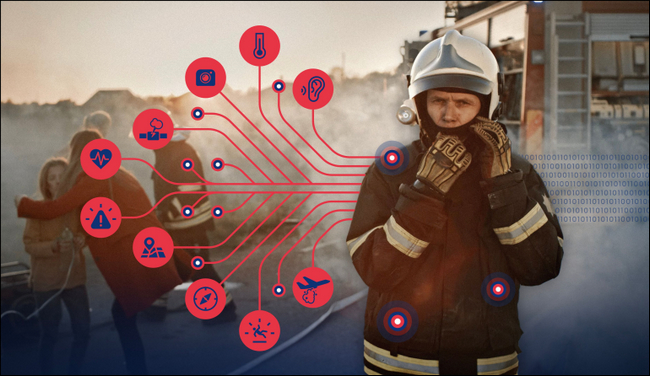
‘Conextivity’: the family group’s new identity denotes an ambitious entrepreneurial and technological vision since it refers to the future of connectivity that Fischer Connectors and Wearin’ are co-creating in partnership with their customers. With double-digit annual growth, Conextivity Group is aiming for a billion Swiss francs in revenue within 10 years.
With this vision, summarized by the motto ‘Reimagining Connectivity’, the family-owned company, founded in 1954, is transforming itself from a connector supplier into a full-service partner for high-performance connectivity.
“Connectivity is of crucial importance in our hyper-connected world,” explains Jonathan Brossard, CEO since 2016 and belonging to the 3rd generation of the Fischer family. “When it is as efficient, reliable and innovative as ours, and when it is applicable to extremely demanding operating environments, connectivity plays a critical role. In this respect, our system-level engineering approach and our holistic vision for our industry expresses nothing less than our sense of responsibility: to reimagine connectivity that creates lasting value in the group's traditional and new markets.”
The connectivity challenge to be met
With its two business activities, Fischer Connectors and Wearin’, Conextivity Group offers a suite of products, solutions and services that span the entire connectivity value chain.
The goal is to meet the challenge posed by the ubiquitous rise of connected devices and sensors. These generate massive and exponential amounts of data and information to support decision making, especially in mission-critical applications as well as in the Internet of Things (IoT). The first technology challenge is to integrate end-to-end connectivity that establishes the physical connection between sensors and communication devices but ensures their need to be interoperable in increasingly demanding environments. There is the challenge of optimizing and harmonizing power and data flows at increasingly high performance and speed, and transmitting these data to the cloud infrastructures that enable them to be processed.
This combination of requirements in terms of performance, reliability, robustness and interoperability applies in particular in the cross-functional and scalable ecosystems found in mission-critical industries such as defence and security, medical, high-precision test and measurement instrumentation, robotics, first responders and wearables for the connected human.
Conextivity Group is a global technology group offering high-performance connectivity solutions that manage power and data flows seamlessly from sensors and devices to the cloud, enabling the emergence of new and scalable ecosystems. With nearly 600 people worldwide, four R&D centres and six manufacturing sites, the Swiss-headquartered group comprises two core businesses: Fischer Connectors and Wearin’.
Fischer Connectors designs, develops and deploys end-to-end interconnect solutions for ecosystems requiring local transfer and management of data, signals and power. Its tailored electronic solutions, connectors and cable assemblies are trusted globally for their reliability in demanding environments.
Wearin' creates IoT wearable solutions that enhance safety and efficiency by improving situational awareness and enabling a better coordination of connected humans such as lone workers, firefighters and first responders. It makes high-risk work environments safer and smarter with real-time insights from user-generated field data.
The circular textile economy is rapidly approaching
Worn Again Technologies announces plans to build a new textile recycling demo plant in Winterthur Switzerland
Worn Again Technologies is in the final planning stages of an innovative demonstration plant that will showcase its ground-breaking polymer processing technologies for textile recycling. The facility, which will be built and operated by the company, is to be constructed in Winterthur, Switzerland and will have the capacity to prevent 1’000 tonnes of textiles from being incinerated every year, paving the way for industrial-scale operations.
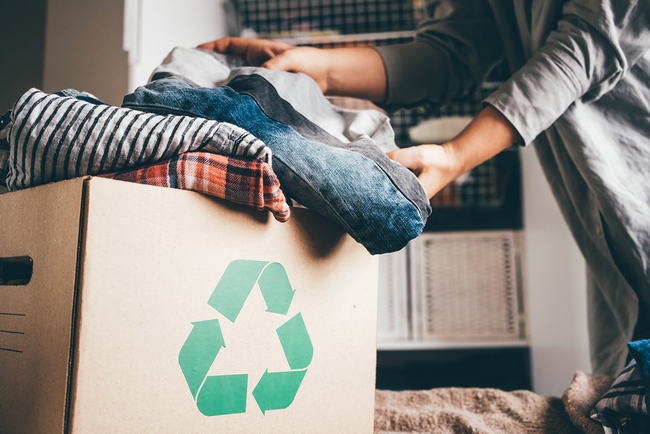 The pilot plant will showcase Worn Again’s ground-breaking polymer processing technologies for textile recycling. (Image Source: shutterstock_1721982319)
The pilot plant will showcase Worn Again’s ground-breaking polymer processing technologies for textile recycling. (Image Source: shutterstock_1721982319)
Worn Again Technologies’ demonstration plant will be constructed near to one of the startup’s technology partners, Sulzer Chemtech, in Winterthur, Switzerland. This represents a crucial step towards upscaling and commercializing the company’s recycling process technology.
In particular, the new industrial-scale infrastructure will help validate the closed-loop chemical recycling solution that has been developed by Worn Again Technologies and its strategic partners. The process obtains polyethylene terephthalate (PET) and cellulose from non-reusable, hard-to-recycle textiles that constitute a post-industrial and post-consumer waste. Additionally, the Worn Again Technologies process purifies the products by removing dyes, contaminants and impurities, a step forward from traditional recycling methods. As such, it delivers high-quality, virgin-like materials that can be reintroduced into supply chains to become new fibers, textiles and other products.
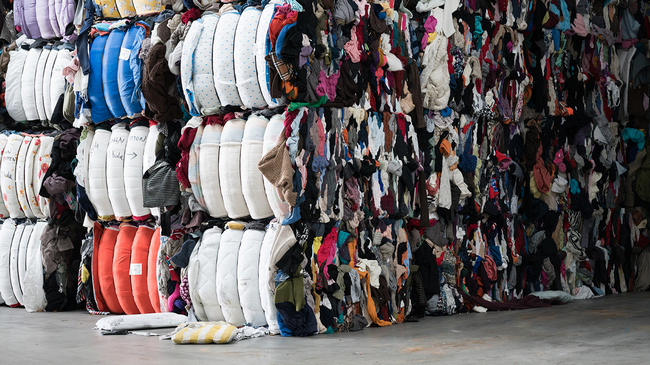 The plant will have the capacity to prevent 1’000 tonnes of textiles from being incinerated every year, paving the way for industrial-scale operations. (Image Source: shutterstock_743587066)
The plant will have the capacity to prevent 1’000 tonnes of textiles from being incinerated every year, paving the way for industrial-scale operations. (Image Source: shutterstock_743587066)
Erik Koep, CEO at Worn Again Technologies, comments: “We are excited to be taking the next step in making reliable, high-performance textile recycling a reality. The construction and operation of this demonstration plant are the next major milestones in achieving our vision for textile circularity. We look forward to starting operations soon and see this as the first plant in a global network of processing facilities.”
Torsten Wintergerste, Chairman of Worn Again Technologies, adds: “We are delighted to see our technologies being leveraged to create a state-of-the-art textile recycling plant. Building it in Switzerland gives Worn Again Technologies direct access to Sulzer Chemtech’s global R&D facilities and the Swiss textile industry. We will build an ecosystem of partners around this demo plant and drive forward the creation of a circular economy of textiles. Switzerland is an ideal location for Worn Again to realize the demonstration plant with all stakeholders in the shortest time period possible.”
Data driven methods to boost microalgae production and CO2 capture
Microalgae are a promising feedstock for a large number of products such as fuel, food and materials. At the same time, algae are able to fix large amounts of CO2 that they use for growth. Approximately 50% of the algae biomass is carbon, and as such, microalgae hold great potential to support efforts to tackle climate change. However, large-scale algae farming faces technical challenges that hinder widespread economically successful applications. VTT Technical Research Centre of Finland is coordinating a two-year research project involving the University of Jyväskylä, Neste and seven Finnish SMEs, jointly addressing some of the bottlenecks in large-scale algal cultivation.
Project ROBA – Robust Algae Systems, funded by Business Finland, aims to tackle hurdles to create economically feasible algae processes through a combination of modelling, advanced measurement technology, bioprocess engineering, machine learning and synthetic biology.
“Microalgae are one of the potential renewable and scalable future raw materials that Neste is developing, with the aim to expand our renewable raw material pool to support the future growth of renewables production. We are also looking for all possible solutions to reduce emissions in order to meet our ambitious goal of carbon-neutral production by 2035. Activities in the ROBA project will contribute to these targets by focusing on a concept for refinery CO2 capture with microalgae and by developing monitoring methods that could be utilized in large-scale algae cultivation,” explains Jason Michael Blake, Vice President of Innovation, Business Platform Aviation Feedstock, at Neste.
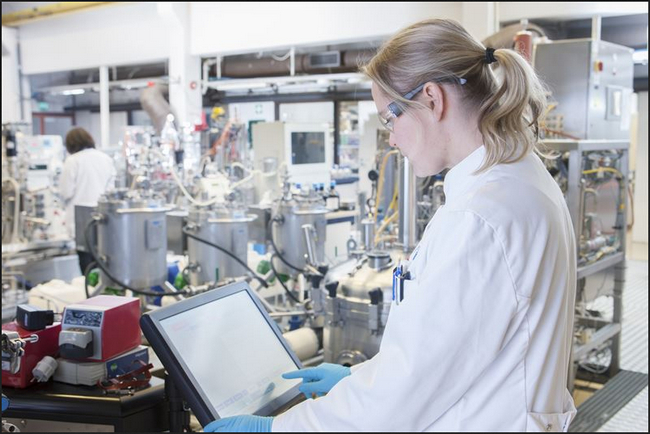
One bottleneck in algae cultivations to be addressed is the monitoring of contamination, which currently is a challenge in large-scale processes and can lead to the loss of entire cultures. In ROBA, a series of optical and other online methods will be explored. The measurement technologies to be developed in the project will be applicable also to other biotechnological processes.
“Industrial biotechnology is becoming more and more an important part of sustainable industrial practices. Our aim is to develop intensification methods for large-scale algal cultivation. Innovative measurement and monitoring technologies will help us to move towards efficient and economically feasible production processes,” says Mervi Toivari, Principal Scientist at VTT.
Machine learning promises to take process monitoring even one step further, by combining various information received from the process into a more complete picture.
“This is a new opening to develop a novel on-site observer and computational methods for the needs of microalgae biotechnology. The Spectral Imaging Laboratory at the University of Jyväskylä focuses on developing a non-invasive monitoring method based on hyperspectral imager technology. Monitoring the growth and product accumulation of microalgae and detecting contamination are the key areas for the development,” says Pauliina Salmi, Postdoctoral Researcher from the University of Jyväskylä.
More about the project
ROBA’s total budget is 1.4 M€ and its main funder is Business Finland. ROBA is one of the ecosystem projects of Neste Veturi. In addition to VTT, the University of Jyväskylä, Business Finland and Neste, the following companies are also participating in the project: Agri-Biotech, Aircohol, Owatec, Pixact, Soilfood, Specim and Timegate. The partners are supporting the project with valuable expertise and insight into measurement technologies in bioprocesses, photobioreactor configurations, products from algae biomass and process equipment.
VTT is a visionary research, development and innovation partner. We drive sustainable growth and tackle the biggest global challenges of our time, and turn them into growth opportunities. We go beyond the obvious to help society and companies to grow through technological innovations. We have 80 years of experience in top-level research and science-based results. VTT is at the sweet spot where innovation and business come together.
VTT – beyond the obvious
Walki introduces a broad portfolio of recyclable materials for the growing frozen food segment
Walki is answering to the growing demand for frozen food by expanding its portfolio of recyclable materials.
The global market for frozen food is expected to grow to 322 billion euros by 2026. Although the demand is growing globally across all age groups, it is especially popular among younger consumers.
- Walki®EVO Seal and Walki®Opti Seal are recyclable paper-based packaging intended especially for pillow-pouches for frozen food.
- Lamibel®MDO-PE is a film-based material for pillow pouches made of reverse printed MDO-film and solvent-free laminated with low sealing LDPE.
- Walki®Pack Tray is a board-based tray suitable for frozen ready-made meals, designed to replace aluminium, plastic or plastic-coated trays.
The global market for frozen food is expected to grow to 322 billion euros by 2026. Although the demand is growing globally across all age groups, it is especially popular among younger consumers.
"Frozen food is an ideal way to prolong shelf life without losing out on the vitamins. It is also an excellent way to combat food waste. This is important as up to 9 % of global carbon emissions can be attributed to food waste, especially fruit and vegetables", says Dudley Jones, Consumer Sales at Walki.
Walki is introducing a broad portfolio of different materials, including printed solutions, to suit the needs of the frozen food market with the aim of making the packaging fully recyclable in the paper stream.
"Frozen food places high demands on the packaging. It needs to be both sturdy and puncture-resistant to handle diverse situations like pressures of sealing and mechanical tear during transportation. The packaging also needs to withstand variability in temperatures as some frozen food is defrosted in its packaging", explains Jones.

Walki®EVO Seal and Walki®Opti Seal are recyclable paper-based packaging intended especially for pillow pouches for frozen food. Walki®EVO Seal has a dispersion coating as a barrier against water vapour and grease while Walki®Opti Seal has an optimised PE-extrusion coating.
"The dispersion coating makes Walki®EVO Seal recyclable in the waste-paper stream without any separation process, while the minimised PE-coating on Walki®Opti Seal makes it suitable to be recycled with paper with an acceptable fibre yield", says Andreas Rothschink, Head of Product Development at Walki.
Both are suitable for all kinds of frozen food: vegetables, seafood, and bakery products to name a few.
Lamibel®MDO-PE is a film-based material for pillow pouches made of reverse printed MDO-film and solvent-free laminated with low sealing LDPE. Thanks to the MDO technology, the film thickness is minimized while performance is maximized by replacing other sorts of materials such as PP- or PET-films.
"This combination of two PE-films makes the packaging fully recyclable in the plastics stream. The stretched film has better optics with high stiffness and mechanical properties than standard PE. The film can also be transparent, allowing the consumer to see the product", says Rothschink.
Lamibel®MDO-PE is an ideal material for all types of packaging (doypack, flowpack, pouches, etc.) as well as all kinds of frozen food like vegetables, sharp-edges seafood and bakery.
Walki®Pack Tray is a board-based tray suitable for frozen ready-made meals, designed to replace aluminium, plastic or plastic-coated trays.
"The tray is easy to fill, transport and store, and is also the convenient choice for the consumer as the fibre-based tray is safe to use in microwaves and in conventional ovens up to 220 degrees for up to 60 minutes," says Jones.
The tray material is 100% PET free and recyclable in the paper stream.
Company Profile Walki
At Walki, we believe in a sustainable and circular tomorrow. Our mission is to accelerate the world’s transition into a zero-waste future in packaging and promote the use of energy-efficient materials across industries. Walki’s product solutions are designed to bring value to customers in many different markets; from sustainable materials for packaging applications to energy-saving performance materials.
Walki is a growing international group organized in three business areas: Consumer Packaging, Industrial Packaging and Engineered Materials, with operations in twelve different countries, both in Europe and Asia.
Now Elmia Wood opens – It’s high time to talk about the forest’s future!

The forest industry is hugely important to both the national economy and our ecosystem’s biodiversity. The question is: how can we help the forest to thrive while we also utilise its resources? At the world’s leading forestry fair, Elmia Wood in Jönköping on 2 – 4 June, this topic will be discussed by top industry professionals and representatives from Sweden’s political parties and industries.
The forest industry plays a huge role in the economy but it works on a very long timeline – it will be a full 50 or 60 years before decisions made now will influence developments!
Today’s highly topical question is: how can we make the forest industry more sustainable and innovative? Thriving forests are necessary for the climate and biodiversity. While we must take care to conserve a healthy and vital forest, we also depend on the resources it gives us.
One key issue is how we can ensure that our forests are as healthy as possible and thrive in the long term. Some people say we need to fell a larger proportion of the forest than we do now in order to get the optimal return, while others argue that we need a standing forest to bind carbon dioxide. As a result, many forest owners are unsure how to best manage their forests.
The forest industry is an important and extremely long-term industry. Not only does the forest give us raw materials for paper and wood products, but the resulting waste also supplies renewable energy. In recent years, society’s dependence on the ecosystem has been the object of increasing attention both in Sweden and abroad. The forest provides many ecosystem services that are of great importance to our future well-being.
The issue of the forest’s own well-being is just as topical in Europe as a whole. The EU has a new forest strategy to increase the amount of forest on the continent. The aim is to guarantee that Europe’s forest industry is managed in a sustainable way.
We need to take into consideration expected climate changes, which will probably lead to more extreme weather conditions, such as storms, torrential rain, and extreme heat and cold. How can future forest owners care for their forests so that they can meet the challenges resulting from these climate changes?
At Elmia Wood in Jönköping topics such as these will be discussed by leading industry professionals and representatives from politics and industry. The focus will be on how the work to create a more innovative and sustainable forest industry should proceed.
The fair’s entire programme is available at elmiawood.se/wood – where we will also broadcast live during the fair days from 2 to 4 June.
Caldera secures £295k to decarbonise industrial steam
Caldera Heat Batteries has secured a £295,000 grant from the Department of Business Energy & Industrial Strategy (BEIS) for a feasibility study on how to roll out thousands of Warmstone heat batteries for use in industrial settings.
- Caldera is designing a factory to mass-produce heat batteries
- Potential to decarbonise many existing industrial processes reliant on high-temperature steam
- Roll out will support the rapid decarbonisation of British industry
The Southampton firm has developed, and already begun to deploy in residential settings, a zero-carbon heat battery, known as Warmstone, which stores heat energy using renewable electricity (either off-peak or generated on-site) and can be released when required as high-pressure steam – the main source of heat for many industrial processes including pharmaceuticals, food processing and brewing.
They have received £295,478 Phase 1 funding from the BEIS Industrial Fuel Switching competition to investigate the design and build of a UK factory capable of rolling out Caldera heat batteries to support the rapid decarbonisation of British industry.
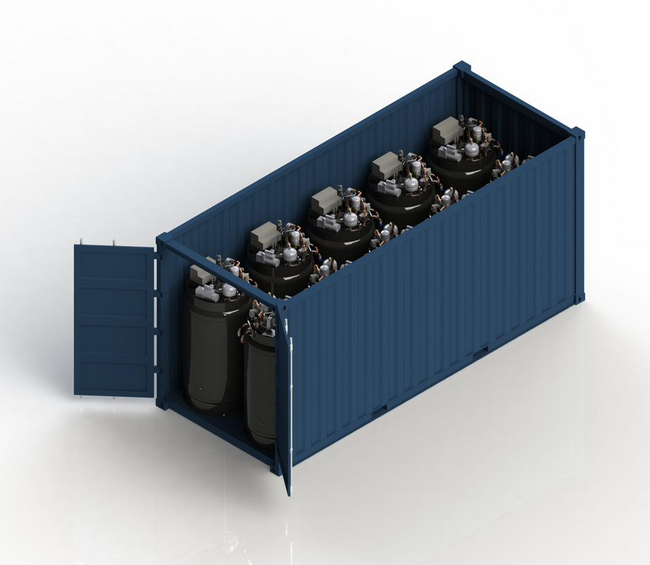
Commenting on the award Caldera CEO James Macnaghten, says:
“Industrial steam makes up 31 percent of the UK’s total industrial process heat requirement. This is normally provided by multiple steam boilers and accumulators that burn natural gas or oil.
“Warmstone is a direct replacement that can provide steam on demand. Single or multiple units contain solid Warmstone material which can be heated up using cheap off-peak electricity and on-site renewables such as solar PV which can be stored with very high efficiency until needed.
“Banks of Warmstone heat batteries can then deliver high-pressure steam as required at temperatures up to 200C. This will enable factories to switch off fossil fuels as their primary fuel source, enabling an easily adopted route to low carbon electrical power.
“In addition, industrial steam boilers and steam accumulators store large quantities of superheated water, which brings significant cost and safety implications requiring continuous manning and detailed annual inspection.
“The adoption of Warmstone heat batteries avoids these risks due to the low quantity of water used without combustion,” Macnaghten concludes.
Energy and Climate Change Minister Greg Hands said:
“As we accelerate the UK’s energy independence by boosting clean, home-grown, affordable energy, it’s crucial that our industries reduce their reliance on fossil fuels.
“This investment will help them to not only cut emissions but also save money on energy bills, on top of supporting jobs by encouraging green innovation across the UK.”
According to the UK Government, industry accounted for 16 percent of UK greenhouse gas emissions in 2018, making it the third-largest emitting sector – therefore meeting the Net Zero target requires near-complete decarbonisation of UK industry. The Committee on Climate Change (CCC) estimated that decarbonising industry will take c. £8 billion in public and private investment a year.
The BEIS Industrial Fuel Switching competition aims to address this by providing innovation funding, as part of the £1 billion Net Zero Innovation Portfolio, to develop fuel switching and fuel switch enabling solutions for industry, while building the UK’s decarbonisation skills and supply chain.
The competition supports the recently published Industrial Decarbonisation Strategy (March 2021), which identified that government investment is required to advance the development of low carbon technologies to address the barrier around uncertainties associated with novel technologies for the private sector.
Leadway to represent Metso Outotec aggregate solutions in Thailand
Metso Outotec has appointed Leadway Heavy Machinery Co., Ltd. as the new local distributor for aggregate solutions in Thailand as of May 2022. Leadway will provide Metso Outotec’s track-mounted, wheel-mounted, and stationary equipment, spare parts and wear solutions, as well as commissioning of aftermarket services and technical support.
“We are pleased to announce Leadway as our new distributor in Thailand,” says Shaun Fanning, VP, Distribution Asia Pacific at Metso Outotec. “They have an excellent and longstanding reputation in the market and a strong commitment to full-service customer support.”
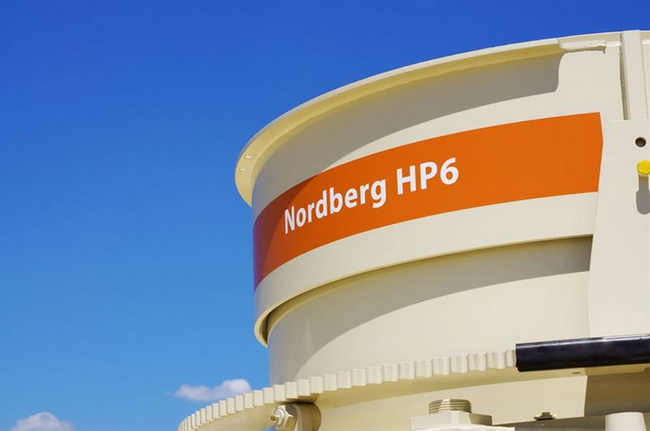
“Metso Outotec offers a dependable range of products and services for aggregate quarries and contractors, which will allow us to expand our business and enter new customer segments,” shares Jimmy - Chakart Seanchan, Chief Executive Officer at Leadway. “This exciting cooperation allows us to provide complete solutions throughout our footprint in Thailand.”
Leadway provides heavy machinery to a diverse customer base across 14 branches in Thailand. Learn more at: https://www.leadwayheavy.com/
Leadway will represent Metso Outotec’s complete aggregates portfolio, including Nordberg® HP™ Series cone crushers
For further information, please contact:
Shaun Fanning, Vice President, Distribution Asia Pacific, Metso Outotec, tel. +61 467 781 663, email: shaun.fanning(at)mogroup.com
Jimmy Chakart Seanchan, Chief Executive Officer, Leadway Heavy Machinery Co., Ltd. tel.+66 (0) 38 086 731-9, Call centre 1462, email This email address is being protected from spambots. You need JavaScript enabled to view it.
Metso Outotec is a frontrunner in sustainable technologies, end-to-end solutions and services for the aggregates, minerals processing and metals refining industries globally. By improving our customers’ energy and water efficiency, increasing their productivity, and reducing environmental risks with our product and process expertise, we are the partner for positive change. Metso Outotec is committed to limiting global warming to 1.5°C with Science Based Targets.
Headquartered in Helsinki, Finland, Metso Outotec employs over 15,000 people in more than 50 countries and its sales for 2021 were about EUR 4.2 billion. The company is listed on the Nasdaq Helsinki. www.mogroup.com
Futraheat lands £149,000 from BEIS to help factories slash fuel use
Factories of the future may be able to slash their fuel use by adopting a new British technology which paves the way to zero-carbon industrial heat processes.
London start-up Futraheat has developed a ground-breaking high-temperature heat pump – known as Greensteam – which can help industrial users recycle heat and radically reduce fuel use – delivering energy reductions of up to 90 percent.
They have partnered with manufacturing integration specialists Projective to secure £149,000 Phase 1 funding from the BEIS Industrial Fuel Switching competition to investigate the feasibility of their product with leading food and pharma businesses.
The project will identify potential partners for a potential £1.5 million Phase 2 where, with BEIS support, Futraheat and Projective will deliver two commercial-scale 500kW Greensteam heat pumps for use in an industrial process, with two customers to be confirmed from Phase 1.
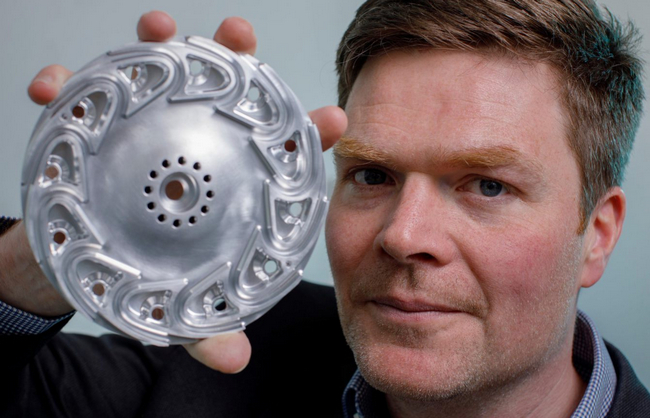
It is hoped that Futraheat and Projective will secure in-kind support for Phase 2, which could commence early next year, from one manufacturer in the food and drink sector and one from the pharmaceutical industry.
Futraheat’s modular, Greensteam heat pump uses a new type of patented turbo compressor, known as TurboClaw®, which cost-effectively recovers low-grade waste heat – a by-product of many industrial processes – and boosts it up to 150 Centigrade, where it can be successfully reused onsite.
Futraheat Managing Director Tom Taylor says:
“Up to 70 per cent of all industrial energy demand is for heat in sectors including pharmaceutical and food manufacturing.
“This heat is commonly provided as low-pressure steam, and in many cases, it is used once and then released to the atmosphere as a waste stream.
Our ground-breaking Greensteam heat pump can recover much of this lost heat – as low as 70 degrees centigrade – and boost it cost-effectively to the high temperatures that industrial customers require. This can deliver CO2 reductions of around 80-90 percent, rising to 100 percent of electricity from renewables is used. Even with a switch to electrical power, users can expect fuel cost savings of between 25 and 40 percent.
“Our high-temperature heat pumps will pay for themselves in two to three years and are a ‘no regrets’ technology which will remain relevant whatever future energy source is used,” Taylor says.
Energy and Climate Change Minister Greg Hands said:
“As we accelerate the UK’s energy independence by boosting clean, home-grown, affordable energy, it’s crucial that our industries reduce their reliance on fossil fuels.
“This investment will help them to not only cut emissions but also save money on energy bills, on top of supporting jobs by encouraging green innovation across the UK.”
Already the Surbiton firm has developed a 300kW prototype and is identifying industrial customers for their beachhead 500kW commercial Greensteam high-temperature heat pump.
According to the UK Government, industry accounted for 16 percent of UK greenhouse gas emissions in 2018, making it the third-largest emitting sector – therefore meeting the Net Zero target requires near-complete decarbonisation of UK industry. The Committee on Climate Change (CCC) estimated that decarbonising industry will take c. £8 billion in public and private investment a year.
The BEIS Industrial Fuel Switching competition aims to address this by providing innovation funding, as part of the £1 billion Net Zero Innovation Portfolio, to develop fuel switching and fuel switch enabling solutions for industry, while building the UK’s decarbonisation skills and supply chain.
The competition supports the recently published Industrial Decarbonisation Strategy (March 2021), which identified that government investment is required to advance the development of low carbon technologies to address the barrier around uncertainties associated with novel technologies for the private sector.
About Futraheat
Futraheat is pioneering the first truly sustainable high-temperature heat pump technology, offering the industry an electrification pathway to net-zero carbon that pays for itself.
About Projective
Projective is an independent company specialising in industrial process and utility engineering, whose services include consultancy, design and project management.
